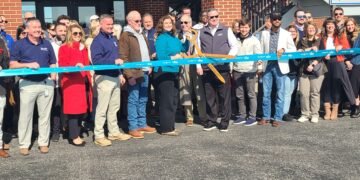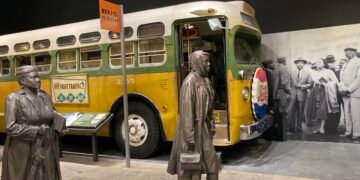When long-time local educator Bob Park was president of his FFA chapter in 1949, the members were all males largely focused on the functions of hands-on farming, like crop production and raising livestock.
Seventy-five years later, Park’s great-granddaughter Lorelei Duncan is president of the Henderson County High School FFA chapter.
A whole lot has changed.
The two leaders separated by more than seven decades of FFA talked about their different experiences leading up to this year’s National FFA Week, Feb. 17-24.
For one thing, there was a good reason why Park’s contemporaries were focused on such things as raising calves and growing corn. That was the nature of things and the pursuits many would likely follow as adults.
“We didn’t know as much about the outside world then,” Park said regarding the rural environment he grew up in.
He made this observation shortly after witnessing a practice presentation at a Lions Club meeting by local the FFA Agricultural Issues Team. At that presentation they argued both sides of rezoning agricultural land to develop it for solar and wind-powered energy concerns.
“That wouldn’t have even been a topic in my day, which probably shows the isolation we experienced,” Park said. “It shows how advanced they are today as opposed to what we did.”
Indeed, something that happened much later, in 1988, illustrates the shift in the wide range of topics and issues considered by students today considering a career in an ag-related field. That year, the decades old organization that was originally called Future Farmers of America changed its name to simply FFA to reflect the growing diversity in agriculture, according to a timeline at FFA.org.
While her great-grandfather was limited in the classes he could take at Hartford High School in Ohio County, Duncan is enrolled at a high school with more than 200 other ag students in the Career & Technical Education unit.
The subject matter is broad, and agriculture is one of the CTE’s most popular program areas. It operates the largest educational greenhouse in the state of Kentucky—including those at colleges and universities. The local agricultural track has many other opportunities, including a veterinary science program.
Horticulture is a career field that Duncan is interested in, and she’s already gained experience through greenhouse work and helping to maintain flower beds and hanging baskets through a co-op program with the city of Henderson. She’s also worked with beekeeping through her coursework. After graduation this spring, she intends to study horticulture and business and maybe someday own her own greenhouse.
The FFA chapter, which is totally student led, is a National 3-Star Chapter (awarded to only 3% of chapters in the nation), and 100% of its members participate in public speaking.
Duncan wouldn’t have had any of these opportunities in her great-grandfather’s era. Females weren’t part of the membership until 1969, when it became possible for them to hold office and participate in competitive events at regional and national levels. It would take seven more years for a female to become the first to hold a national office.
The two agree that some things are constant with FFA, such as leadership development, including learning the rules of running a meeting properly and techniques for speaking confidently in public.
Park, who is a long-time public speaker and storyteller in addition to leading various community organizations and projects, said FFA teaches how “to have respect for each other in a group setting.” He said FFA influenced his decision to become an educator.
Duncan said that one of the greatest things she’s learned through FFA leadership is that nobody is more important than another person, not even the president.
“The personal growth is amazing,” said Duncan, a self-described “people person.” “FFA has really pushed me (and) everyone needs to be pushed. It has really changed my life.”
Back in the fall, FFA adviser J.T. Payne invited Park to speak at the chapter’s junior officer training day.
At the program, Park told the students that leadership skills built in FFA are generational.
Some of the “nuggets” he shared that day:
- You’ll never repeat this moment in life again. Make it count.
- Everyone needs encouragement in their life. You can be the encourager.
- Don’t expect the same from everyone with different backgrounds, but make everyone feel like they count.
- There is no room for jealousy on a team. If they succeed, you succeed.
















